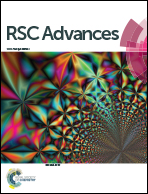Synthesis of novel copolymers based on p-methylstyrene, N,N-butylvinylimidazolium and polybenzimidazole as highly conductive anion exchange membranes for fuel cell application
Abstract
A series of copolymers as anion exchange membrane materials were synthesized by the copolymerization of N,N-butylvinylimidazolium with p-methylstyrene and polybenzimidazole, and then the corresponding membranes were prepared and are abbreviated in this study as VIBx/PMSy/PBIz. The components of the three polymeric blocks were optimized in order to realize a good compromise between different properties. Membrane test results revealed that the percentage of a single polymeric block in the copolymer influenced directly the anion conductivity of the membrane. Comparing to the commercial membrane A201 Tokuyama, six of the present membranes had a better conductivity at high temperatures, and three displayed better conductivity at all temperatures. The best conductivity is observed for membrane VIB5/PMS1/PBI0.5 which reaches chloride conductivity of 26.3 mS cm−1 at 25 °C and 73.7 mS cm−1 at 100 °C. The membrane had an IEC of 2.6 mmol g−1 and a low activation energy of 6.62 kJ mol−1. Membrane VIB5/PMS2/PBI0.5 is also among the three membranes that had better conductivity, and had 10.77% swelling ratio and 6.66 kJ mol−1 of activation energy. Most membranes showed a low activation energy and in-plane swelling ratio. So far all membranes exhibit a linear Arrhenius behavior and are thermally stable up to 250 °C. The morphology study explored by TEM and AFM showed a well-developed bicontinuous phase distribution of hydrophilic and hydrophobic regions that confirmed a facile transport through the ion channels deduced after the finding of activation energy results.



 Please wait while we load your content...
Please wait while we load your content...